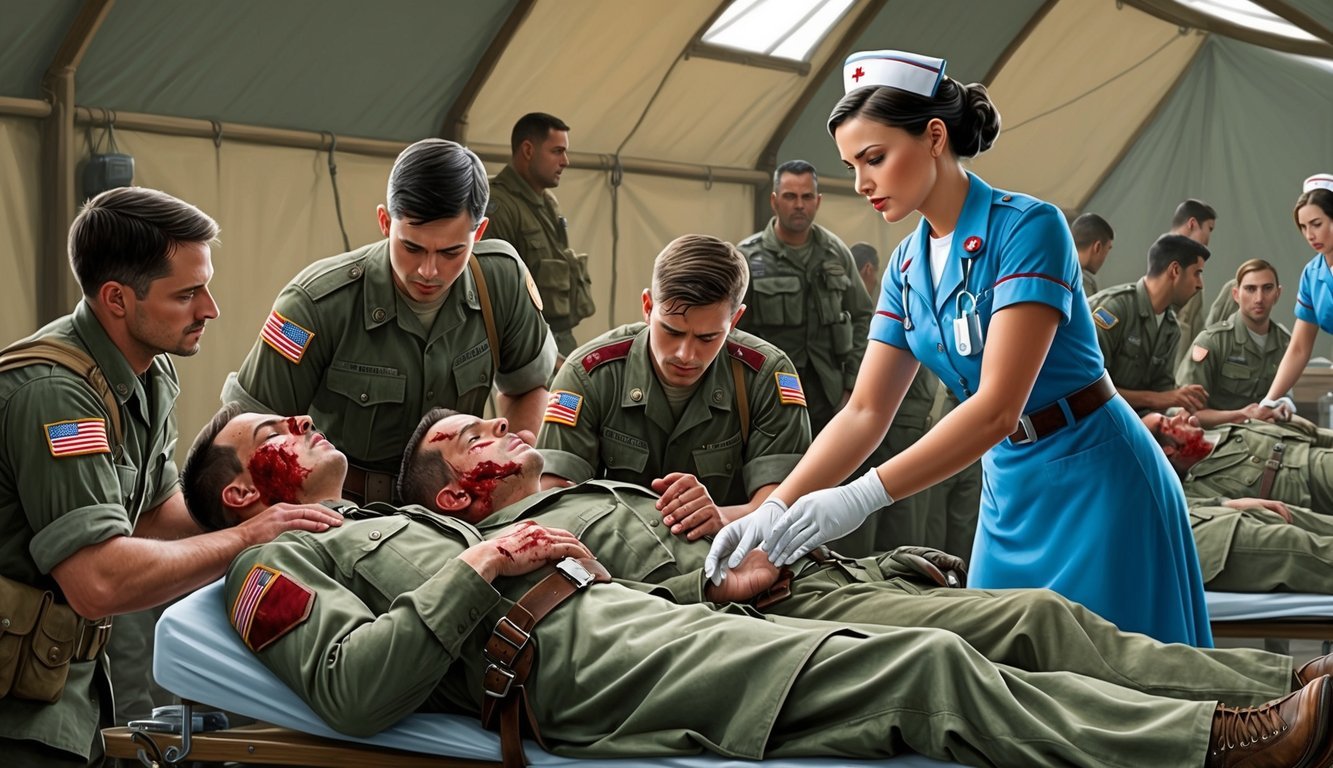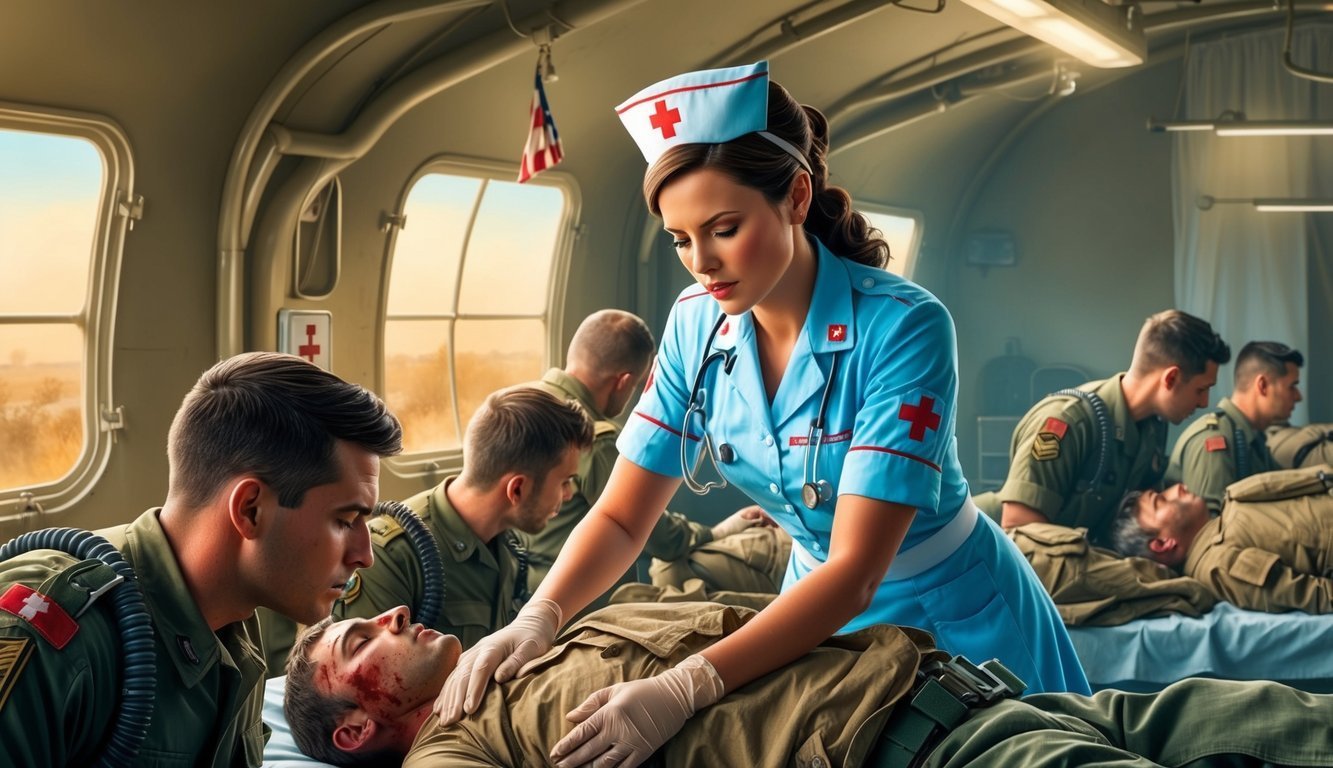Joining the Army as a nurse offers a unique opportunity to serve your country while advancing your nursing career.
You can enjoy competitive salary, special pay incentives, and full tuition coverage for your education.
This path not only allows you to provide care to service members and their families but also opens doors to a variety of career opportunities within the military healthcare system.
As an Army nurse, you will be required to meet specific qualifications and follow an educational pathway to prepare for your role.
This involves obtaining at least a Bachelor of Science in Nursing (BSN) and completing related training programs.
Life in the Army comes with its own set of challenges and rewards, providing experiences that can shape your personal and professional growth.
Exploring the life of an Army nurse reveals the benefits of serving, such as job security, specialized training, and the chance to work in diverse environments.
Many find this role not only fulfilling but also a chance to build lifelong skills that extend well beyond their time in uniform.
Key Takeaways
- Army nurses enjoy competitive salaries and educational benefits.
- A BSN is required to join the Army as a nurse.
- Serving as a nurse in the Army offers diverse career opportunities.
Understanding Army Nursing
Army nursing offers unique opportunities and challenges.
As a military nurse, you will play a crucial role in healthcare delivery while serving your country.
The Army Nurse Corps includes various responsibilities and possesses a rich history that shapes its current practices.
Roles of an Army Nurse
As an army nurse, you serve as a critical healthcare provider in various settings.
Your duties include assessing patients, planning care, and administering treatments.
You also assist in surgeries, manage trauma cases, and provide education to soldiers regarding health and wellness.
Key responsibilities can include:
- Patient Care: Providing nursing services in hospitals, clinics, and deployed environments.
- Leadership: Leading medical teams and managing nursing personnel.
- Emergency Response: Acting quickly in crisis situations, especially during combat operations.
You contribute to both physical and mental health services, ensuring comprehensive care for soldiers and their families.
The Army Nurse Corps positions you uniquely to make a significant impact on military readiness and soldier wellness.
Army Nurse Corps History
The Army Nurse Corps (ANC) was established in 1901, marking the formal recognition of nursing as a vital profession in the military.
It was founded to meet the needs of soldiers during times of war and peace.
Key milestones include:
- World War I: Significant growth in the number of nurses serving, with thousands deployed to care for wounded soldiers.
- World War II: Expansion of the ANC, with nurses playing vital roles in combat zones and military hospitals.
Today, the ANC continues to evolve, integrating advanced technologies and practices into military healthcare.
As a nurse, you become part of this ongoing legacy, contributing to a tradition of excellence and dedication in military service.
For more information on the history of the Army Nurse Corps, visit Army Nurse Corps.
Educational Pathways
Pursuing a career as a nurse in the Army involves various educational pathways.
You can choose from nursing degrees or programs, Army ROTC nursing opportunities, and options for continuing education.
Each pathway offers unique benefits that can help you achieve your goals.
Nursing Degrees and Programs
To become a military nurse, you typically need to earn a Bachelor of Science in Nursing (BSN).
This program usually takes around four years to complete.
A BSN aligns with the Army’s requirement for commissioned officers.
If you already hold an Associate Degree in Nursing (ADN), consider enrolling in an RN-to-BSN program.
These programs often allow you to transition to a BSN in about 9-24 months.
Key Points:
- BSN programs provide a strong foundation in nursing.
- RN-to-BSN programs cater to those with existing nursing credentials.
Additionally, various scholarships are available that can cover full tuition for nursing degrees.
Look into programs that offer support for student loan repayment as well.
Army ROTC Nursing Programs
Joining an Army ROTC (Reserve Officer Training Corps) nursing program can benefit your educational journey.
ROTC programs allow you to complete your nursing degree while training to become a military officer.
Through Army ROTC, you gain leadership skills and military training alongside your academic courses.
Participants are eligible for various scholarships that can significantly reduce the cost of your education.
Benefits Include:
- Tuition assistance up to full coverage.
- Monthly stipends for living expenses.
Check your local colleges or universities to learn more about their ROTC nursing programs.
Continuing Education and Specializations
Once you hold a nursing degree, continuing education is essential for advancing your career.
You may choose to pursue a Master of Science in Nursing (MSN) to specialize in areas such as nurse practitioner or clinical nurse leadership.
Specializations can open doors to advanced roles within military healthcare.
Many programs offer support for funding through scholarships and financial aid.
Continuing Education Options:
- Online courses for flexibility.
- Certification programs in various nursing specialties.
Participating in ongoing education will keep your skills sharp and enhance your qualifications as a military nurse.
Army Nurse Candidate Qualifications
Becoming an Army nurse candidate requires meeting specific qualifications.
These include obtaining a nursing license, fulfilling physical fitness standards, and demonstrating leadership abilities.
Here are the key areas to focus on:
Commissioning as an Officer
To serve as an Army nurse, you must be a commissioned officer.
This requires citizenship in the U.S. and holding a bachelor’s degree in nursing.
You’ll need to complete the NCLEX-RN exam to obtain your RN license.
Additionally, you must apply for and successfully complete an Army commissioning program.
This grants you the rank of second lieutenant upon entry.
Army Nurse Corps officers are essential for managing both patient care and leading nursing staff.
It’s important to understand the responsibilities that come with the role, including upholding military standards and policies.
Physical and Medical Requirements
The Army has strict physical and medical standards for nurse candidates.
You must pass a medical examination that assesses your overall health.
Additionally, you need to meet the Army’s physical fitness requirements, including aerobic capacity and strength tests.
The basic requirements include age limits and maintaining an appropriate Body Mass Index (BMI).
You will also undergo regular fitness assessments, ensuring you are prepared for the demands of the job.
You can learn more about physical standards through the U.S. Army Health Promotion Program for guidance on fitness and health.
Leadership and Nursing Skills
As an Army nurse, you need strong leadership skills to lead teams and make critical decisions under pressure.
Your nursing skills must include not only clinical expertise but also the ability to manage patient care effectively.
Army nurses often operate in diverse environments, requiring adaptability and quick thinking.
In addition to technical skills, you should demonstrate effective communication, teamwork, and problem-solving abilities.
You may benefit from leadership training programs offered by the Army, which help develop these skills.
Training as a nursing student also provides essential hands-on experiences.
Career Opportunities and Benefits
Joining the Army as a nurse opens the door to various job roles and offers significant financial incentives and career growth opportunities.
You will find that the support and recognition in this career can be rewarding both personally and financially.
Job Roles and Clinical Specialties
As an Army nurse, you can choose from a wide range of job roles and clinical specializations.
Some examples include:
- Critical Care Nurse: Provide care for patients in intensive care units, requiring advanced skills.
- Psychiatric Nurse Practitioner: Focus on mental health, diagnosing and treating psychiatric conditions.
- Nurse Anesthetist: Administer anesthesia and provide care before, during, and after surgical procedures.
These roles allow you to work closely with diverse patients and tackle unique medical challenges.
Additionally, the Army provides specialized training that enhances your nursing skills and makes you more adaptable in various healthcare settings, unlike many civilian positions.
Career Growth and Leadership Opportunities
The Army encourages career advancement through leadership roles.
You may start your career as a Nurse Officer and have the chance to rise through ranks to positions such as Major, Lieutenant Colonel, or Colonel.
The Army offers programs aimed at developing your leadership skills.
You can engage in mentoring, advanced training, and continued education.
This commitment to professional development helps you prepare for higher responsibilities and roles within the military healthcare system.
Financial Incentives and Rewards
Financial benefits are a key aspect of joining the Army as a nurse.
You may qualify for various incentives such as:
- Access to Sign-on Bonuses: Many new nurses receive sign-on bonuses, which can be substantial.
- Health Professions Loan Repayment: Programs that help pay off nursing school debt over time.
Here is a quick snapshot of potential earnings:
| Experience Level | Estimated Annual Salary |
|---|---|
| Entry-level | $61,040 |
| 1-4 Years | $70,430 |
These financial incentives, along with the chance to serve your country, make joining the Army as a nurse a compelling career choice.
Life in the Army as a Nurse

As an army nurse, you are part of a unique and challenging environment.
Your role can involve various deployments, assignments, and interactions within military healthcare facilities.
Balancing your personal and professional life is essential in this fast-paced setting.
Deployment and Assignments
Army nurses often face deployments that demand adaptability and readiness.
Deployments can occur in diverse environments, including combat zones and humanitarian missions.
As a military nurse, you may provide care to wounded soldiers or civilians in need.
Your specific assignments can vary greatly.
You might work in military hospitals, clinics, or even temporary field hospitals during emergencies.
Understanding the unique challenges of each assignment is crucial for providing effective care.
You will also work alongside other military personnel, enhancing teamwork and collaboration.
Working in Military Healthcare Facilities
In military healthcare facilities, you will encounter a range of medical situations.
You will care for active-duty service members, veterans, and their families.
Military hospitals and clinics often have specialized departments, including trauma, pediatrics, and mental health.
Each facility has its own protocols and standards, which you will need to learn quickly.
You may work with advanced medical technology and participate in training sessions to stay current with military nursing practices.
This hands-on experience is vital for your growth as a nurse in this field.
Balancing Personal and Professional Life
Balancing personal and professional life is vital for your well-being.
Deployments can be demanding, so it’s essential to establish a support system.
Connecting with family and friends will help maintain your mental health during challenging times.
Time management skills are crucial.
You’ll need to juggle shifts, professional development, and personal time.
Setting boundaries and prioritizing self-care will ensure you remain effective in your role.
Embracing this balance will help you thrive as a military nurse.
Frequently Asked Questions

This section covers important information regarding requirements, earnings, benefits, rank, training, and age limits for joining the Army as a nurse.
Understanding these factors can help you make an informed decision about your career path.
What are the requirements to become an Army nurse?
To become an Army nurse, you typically need to meet several requirements:
- Education: A Bachelor of Science in Nursing (BSN) is required.
- Licensure: You must have a valid RN license.
- Age: Generally, you should be between 21 and 42 years old.
- Citizenship: U.S. citizenship is necessary.
- Background Check: You must pass a security clearance.
For detailed requirements, visit NursingProcess.org.
How much do nurses in the army earn?
The salary for Army nurses can vary based on experience and rank.
| Experience Level | Estimated Annual Salary | Monthly Income |
|---|---|---|
| Entry Level | $61,040 | $5,090 |
| 1 to 4 Years | $70,430 | $5,870 |
You can learn more about specifics at Nurse.org.
What benefits are provided to nurses in the military?
Army nurses enjoy a range of benefits, including:
- Health Care: Comprehensive medical coverage for you and your family.
- Education: Tuition assistance and loan repayment programs.
- Retirement: A strong retirement plan after 20 years of service.
- Housing: Access to subsidized housing.
For more details on these benefits, check U.S. Army Recruiting Command.
At what rank do nurses enter the Army, and how is rank progression handled?
Most Army nurses start as Second Lieutenants (O-1).
Rank progression is based on time served, performance evaluations, and professional development.
Officers can be promoted to higher ranks, such as First Lieutenant and Captain, typically after completing required milestones.
Do Army nurses have to complete basic training, and what does it entail?
Yes, Army nurses must complete basic training.
This training, known as the Officer Basic Course (OBC), lasts about 12 weeks.
It includes military skills, leadership training, and introductions to Army policies and procedures.
Are there age limitations for joining the military as a nurse?
Yes, there are age limitations.
You must be at least 21 years old and not older than 42 at the time of commissioning.
This age limit ensures that candidates can meet the physical demands of military service.

